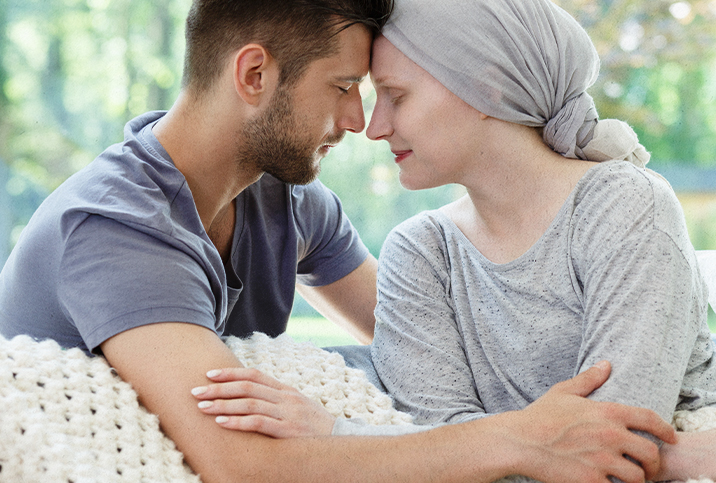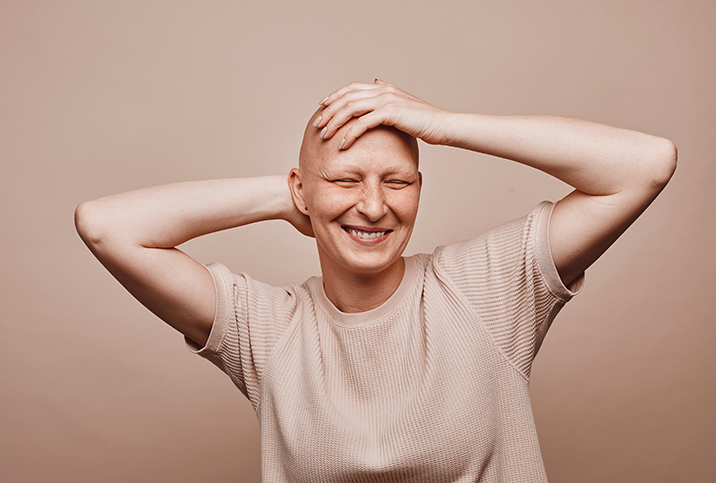Pancreatic Cancer and Sex

The American Cancer Society estimates about 62,210 people (32,970 men and 29,240 women) will be diagnosed with pancreatic cancer in the United States over the course of 2022.
Pancreatic cancer causes the cells in the pancreas to stop functioning properly and grow out of control, affecting the function of the pancreas. Cancerous cells can build up and form a mass called a tumor. Pancreatic cancer also has the potential to grow and spread to other parts of the body. There are no specific screening tests for pancreatic cancer and it can be difficult to diagnose.
If diagnosed with pancreatic cancer, you will likely have to undergo various treatments, such as chemotherapy or surgery. Cancer, and the treatments, can impact all aspects of your life, including your sex life and relationships.
A brief overview of pancreatic cancer
First, let's introduce the pancreas. It's a long and flat organ located behind the stomach in the abdomen. Its main function is as part of the digestive system, secreting a juice containing a number of digestive enzymes that break down carbohydrates, fats and proteins in the stomach to move to the duodenum, the first part of the small intestine. It also functions as an endocrine gland regulating blood sugar levels.
Christopher Manz, M.D., a medical oncologist at the Dana-Farber Cancer Institute in Boston and an instructor in medical oncology at Harvard Medical School, said pancreatic cancer is the 10th most common cancer and accounts for approximately 50,000 deaths each year.
"Pancreatic cancer can be challenging to detect as symptoms can be very vague," Manz explained. "By the time symptoms occur, cancer has often spread. Unfortunately, most patients don't have any symptoms until pancreatic cancer is at an advanced, incurable stage."
He said symptoms are nonspecific and include:
- Unexplained weight loss
- Vague abdominal pain or discomfort
- Nausea
- Jaundice, a yellowing of the eyes and, eventually, the skin when pancreatic cancer blocks the liver
According to Manz, pancreatic cancer is diagnosed with a CT (computed tomography) or MRI (magnetic resonance imaging) scan followed by a biopsy. When found at an early stage, he said it can sometimes be cured with a combination of surgery and chemotherapy.
"Despite its promise in other cancers, immunotherapy is not effective for pancreatic cancer," he added. "Incurable pancreatic cancer is treated with chemotherapy. Unfortunately, survival rates for pancreatic cancer are poor, with only 12 percent of patients surviving for five years, compared to 91 percent for breast cancer patients."
These statistics can seem quite frightening. However, survival rates differ for various stages of pancreatic cancer. They are also based on large groups of people with pancreatic cancer and can't predict precisely what will happen to you. You should speak to your oncologist about your own diagnosis, prognosis and situation.
Pancreatic cancer and sexuality
When you've been diagnosed and are living daily with pancreatic cancer, sex and intimacy are likely far from the forefront of your thoughts. On the other hand, sex—or the lack of it—may be a concern in your relationship. Cancer can affect your sex life in several ways, but it's important to remember it's impossible to predict exactly how pancreatic cancer will affect you and your sexuality.
Occupational therapist and sexuality clinician Tess Devèze is the founder of ConnectAble Therapies in Melbourne, Australia, and the author of "A Better Normal: Your Guide To Rediscovering Intimacy After Cancer."
"If you have sexual changes, that's normal, because look at what is happening to your body: fatigue, pain, toxins from treatments and perhaps recovery from surgery," they explained. "Everyone puts pressure on themselves that their body should work, they should want sex and they should be providing their partner's sexual needs. And people often feel like they're broken, that there's something wrong with them because they are having sexual changes."
Devèze emphasized that sexual changes when living with cancer are entirely normal.
"When I support people through their cancer recovery, there are three main topics that are most common regarding sex and sexual health: libido; body image, self-esteem and self-confidence; and genital dysfunction," they added.
With this in mind, let's look at each point in more detail.
You and your libido
Pancreatic cancer and its treatment can lower your libido. Your body is coping with tiredness, anxiety, side effects from cancer drugs, physical recovery from surgery, and changes in your hormone levels. Devèze advised that there is also a protective mode that kicks in.
"So many people don't reach out to their partner for things like a hug because they're scared that connection and touch will mean they want sex," they said. "And then there's the fear of sex because it means getting naked. It means using your body in a way that might cause discomfort."
This protective mode often leads people with cancer to withdraw from their partner due to fear, guilt or embarrassment.
Talking to your partner about sex and cancer can make all the difference. A simple but powerful method of communication is learning how to make an offer that is very descriptive and eliminates false expectations, Devèze said.
"It's about simply showing affection in the moment and building a stepping stone to reconnection in the relationship itself," they explained.
But how do you do this?
Devèze provided a couple of practical examples you could use with your partner:
- "I love you. Would you like to hold hands while we walk down the street?"
- "I'd really like to kiss you. Can we only kiss in the ad break?" for instance, while watching TV.
The strategy is to eliminate the possibility of the situation escalating to sex.
"Neurologically, one of the best ways to rehabilitate libido is pressure-free connections that aren't about sex," Devèze said. "You start to want that touch more and then that's the desire for affection. It's like hacking your brain to want intimacy and sex again."
Body image, self-esteem and self-confidence
Pancreatic cancer can cause unexplained weight loss and jaundiced skin, and you may also have scars from surgery. Chemotherapy can cause changes to your skin, hair, nails and other aspects of your appearance. It's not unusual for anyone with any type of cancer to be concerned about their body image and feel low self-esteem.
For instance, one woman with whom Devèze consulted hadn't undressed in front of her husband in five years because she was embarrassed by her scars, weight changes and stretch marks, they said.
We don't find it normal to talk about our bodies even when we're healthy. People with cancer often feel ashamed that their bodies aren't the same as they used to be. But Devèze revealed that when the woman openly told her husband about her body concerns, his response was simply, "I just want to love you." This brought relief and a new closeness to the relationship.
No one can predict how their body and sexuality will change due to cancer treatment.
If you're in a relationship and dealing with cancer, you may worry your partner looks differently at you or does not like the changes in your body. But your partner's feelings about you are not only about how your body looks. Talking openly about your concerns can have a positive effect on your relationship.
You also need to take time to recover from treatment and adapt to the changes in your body. No one can predict how their body and sexuality will change due to cancer treatment.
"Being able to express your struggles to the people you love without shame and fear is essential to sexual recovery," Devèze said. "And it's not about sex. The sex comes later. It's about connecting, intimacy and quality of life."
Genital dysfunction
Chemotherapy can affect your sex life and your sexual organs, too. It might make you more sensitive or less sensitive to touch than usual. People may experience vaginal dryness, changes in their ability to get an erection, and difficulties having an orgasm or not having an orgasm at all.
"It's so important to get the message out to people, especially young people, that sex doesn't have to end in orgasm [or] ejaculation and it doesn't have to be penetrative," Devèze explained. "Orgasms feel great, but simply cuddling your partner naked or experiencing touch can release the same hormones as an orgasm."
There's a lot of miseducation around what sex can actually be, creating an expectation that sex should look and be a certain way, which can lead to disappointment and frustration. But Devèze explained that sex is neurological as well as physical.
"Medication and treatment can have a huge impact on the ability to orgasm," they said. "I suggest clients ban orgasms even if they are able to orgasm."
They explained that not focusing on an orgasm frees the mind to reconnect to pleasure. It's a "use it or lose it" concept, according to Devèze: The less you engage in pleasure and the less sensitivity or sensory stimulation you have, the weaker those pathways will get in your brain.
"I teach clients games," they said. "You're going to explore each other's bodies and you're going to have an amazing time and you are not going to orgasm. And it just blows people's minds."
Devèze discussed cancer patients' feedback statements such as, "I didn't know that my thighs were that sensitive" and "I felt like I was going to have an orgasm and all my partner did was kiss my neck."
"Pleasure is pleasurable," Devèze said. "Sex is great, but pleasure is also sex. You don't need to have the pressure of orgasm, ejaculation or penetration."
Sex is not just about having sex. It's about how you feel about yourself, your body, your sexuality, your desire to have sex and your desire to be touched and loved.
Having pancreatic cancer and undergoing cancer treatment can make you feel differently about your body and sex. But the right support can help you comfortably figure out your body and how to like it again. If you have a partner, it helps to do this in a safe, slow and contained way involving a lot of communication.
It can be hard to know what to physically and mentally expect before, during and after cancer treatment. Knowing how to start these conversations with a loved one can also be difficult. So if you are concerned about sex and relationships when living with cancer, reach out to a professional for support and advice. Opening the lines of communication, taking things slowly and building your body confidence all lead to a healthy sexual recovery.


















